You could spend hundreds of dollars on a solar panel, but you're better off investing in a foldable one. These compact devices are easy to carry and store, making them perfect for hikers, campers, and anyone else who likes to be off the grid.
Foldable solar panels can generate power no matter where you are — as long as there's some sunlight. Some models even come with built-in batteries so you can charge your gadgets at night. Since they're lightweight and compact, they're also great for people who want to live “off the grid” without spending too much money or taking up too much space in their home.
There are many different types of foldable solar panels available on the market today, ranging from budget-friendly ones that generate around 100 watts of power to more advanced options that produce 1,000 watts or more. The type you choose depends on how much power you need and how often you plan on using it — if it'll just sit in your camping supplies most of the time but still come in handy now and then when you go hiking or fishing, a low-powered model is fine. If it's going to be an essential part of your survival kit during an emergency situation when resources are scarce, it makes sense to invest in a high-capacity option instead.
How We Choose
There are a lot of things to consider when choosing the best foldable solar panels, but our team has done all the hard work for you. We've looked at dozens of different products and only included those that meet or exceed our expectations in terms of quality, durability and customer satisfaction. Furthermore, we've taken into account a variety of factors such as portability (how easy they are to carry around), size (how big they unfold), capacity (how much energy they can generate) and price so that you can find the perfect match for your needs and budget.
ROCKPALS SP003 100W Portable Solar Panel
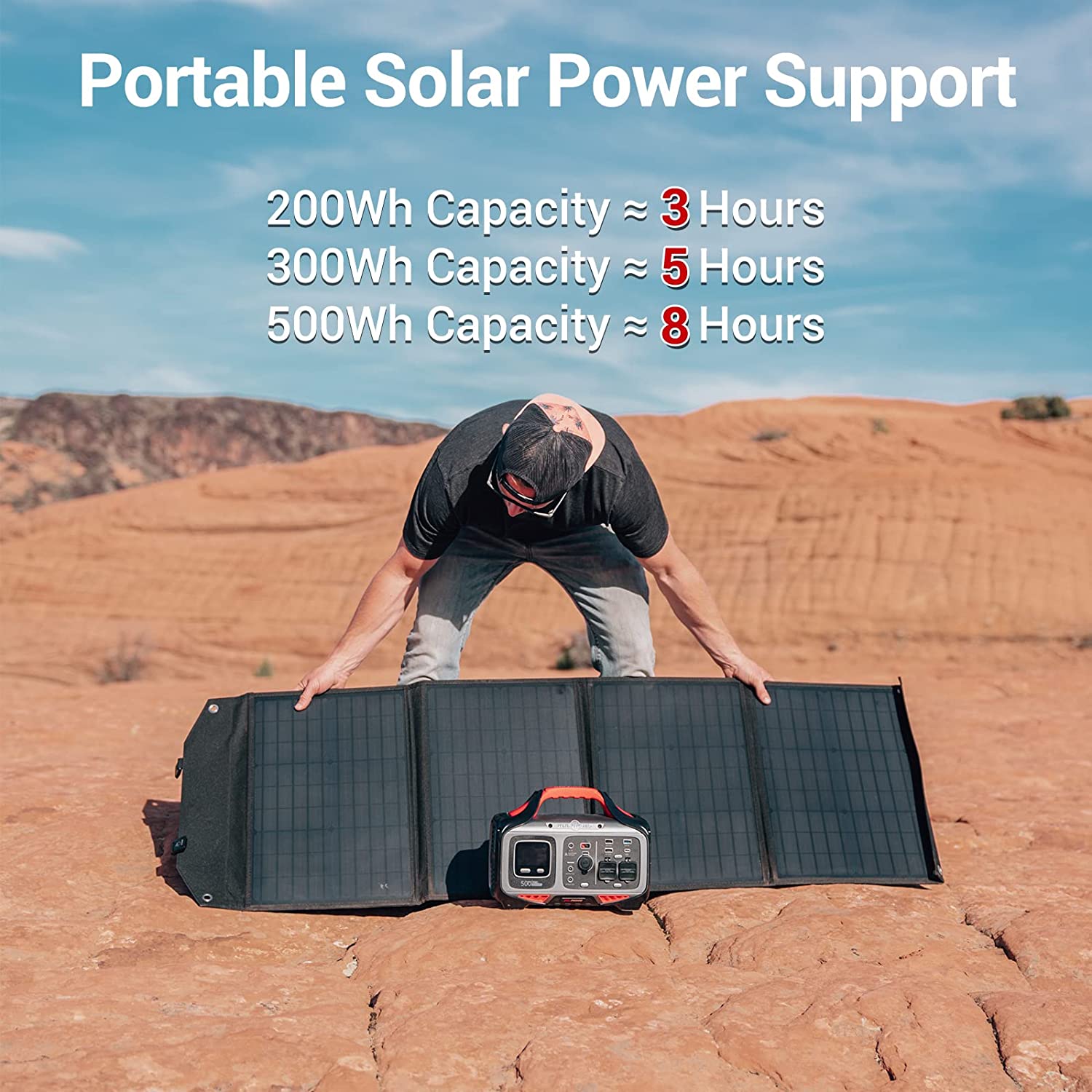
Rockpals 100W foldable solar panel is a high-performance and durable solar charger. It comes with an IP65 waterproof rating, making it ideal for outdoor activities like camping, hiking, and climbing.
This charger features four holes on the top to allow you to tie it down or attach it to a car roof or tree for easy charging when you're on the go. The Rockpals 100W foldable solar panel charges your devices quickly thanks to its smart IC chip that intelligently identifies your devices and maximizes its charging speed without overcharging. This means you can charge your phone multiple times before needing a new battery pack.
The Rockpals 100W foldable solar panel also has a USB Type C port so you can use it with newer smartphones that have this type of connector built in. The included 18W USB 3.0 cable provides fast charging so you won't have to wait long before your device is fully charged up again.
ATEM POWER 200W Portable Solar Panel
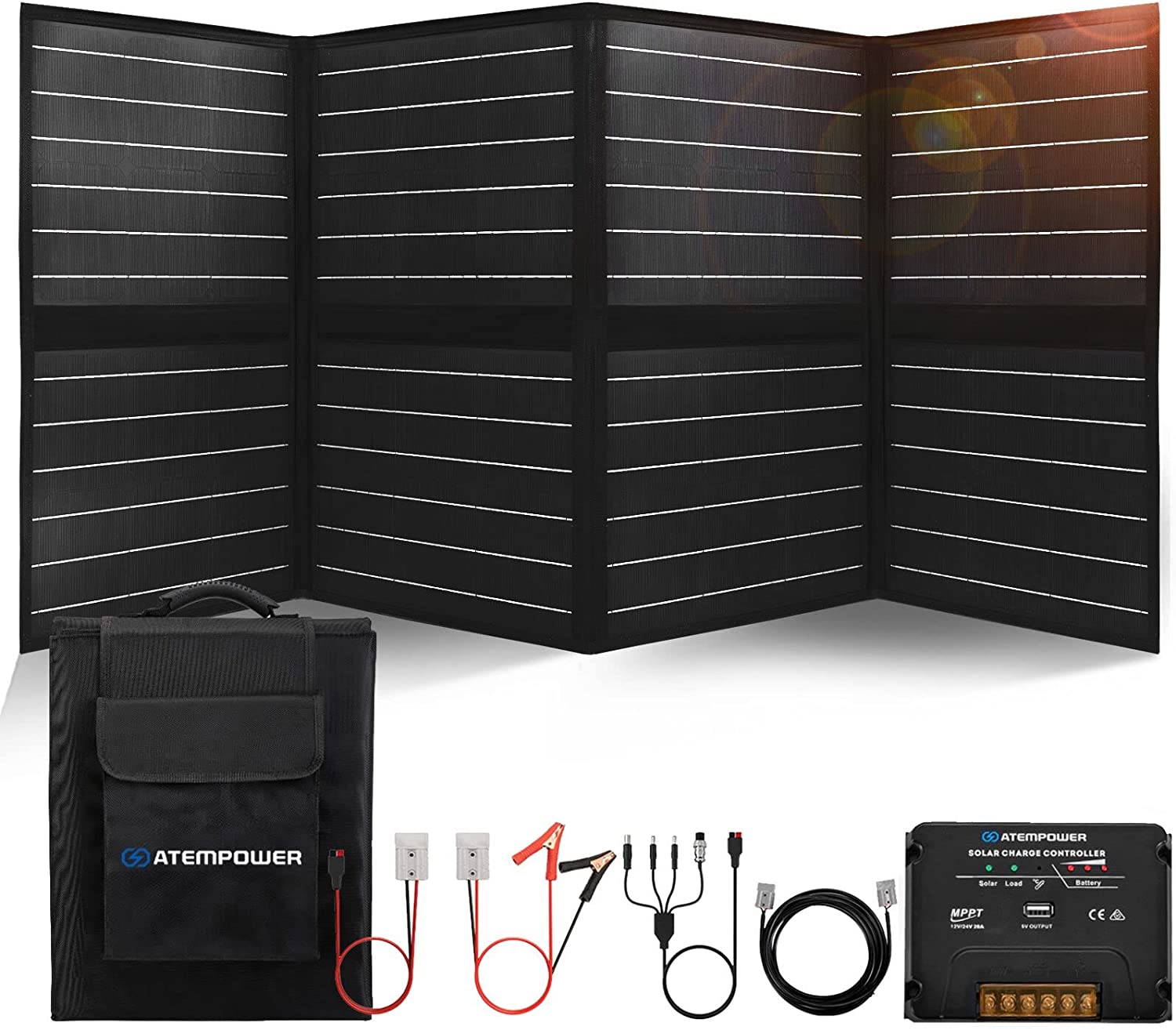
The ATEM Power Universal Solar Panel is a high-quality, foldable solar panel that is ideal for camping and hiking trips. It comes with an auto-optimization function to ensure reconnection when sunlight returns after charging interruption, which makes this portable solar panel hassle free to use.
This monocrystalline solar cell features the fastest charging speed possible with an energy conversion efficiency of up to 21%. The super thin design allows you to pack it down into a small package that can be carried around easily. This means you don't have to worry about finding somewhere sunny or shady where you can charge your device - just take this along on your next adventure and let the sun do the work for you!
The compact size also makes it easy to store away out of harms way in case there isn't any sun available when you are out and about. With 20% more energy harvesting than a PWM controller, this panel will allow larger currents so if you want to charge multiple devices at once then this could be the perfect solution for you!
Renogy 200 Watt 12 Volt Portable Solar Panel
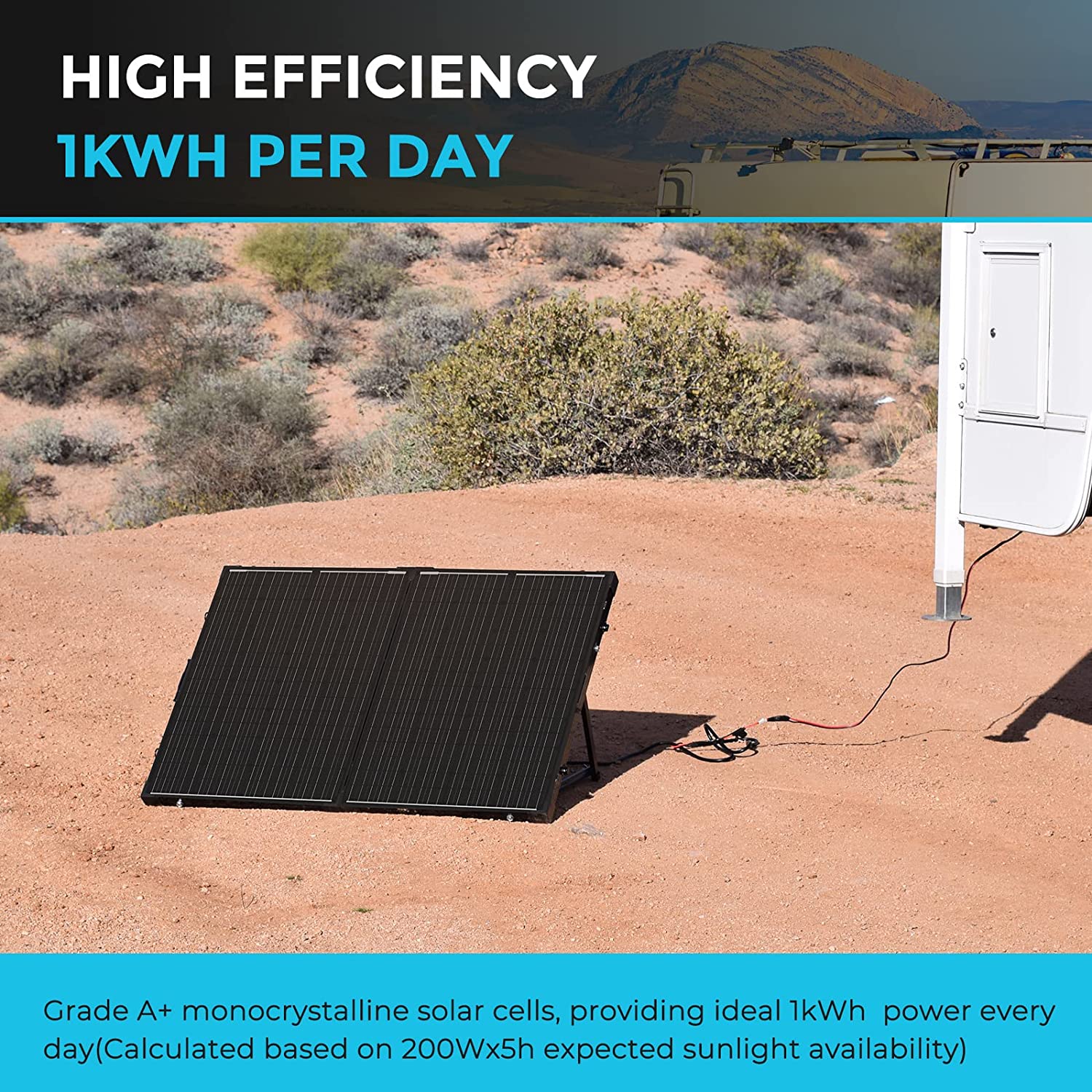
Renogy's 200-watt solar panel is a great option for those looking to power their RV or camper. This Renogy panel has a foldable design that makes it easy to transport and set up, even in the middle of nowhere.
It comes with a waterproof 20A Voyager charge controller, which is smart PWM technology that ensures efficient charging and safety. The Renogy 200 watt 12 volt portable solar panel also uses monocrystalline cells, so you can expect high efficiency from this kit.
The Renogy 200 watt 12 volt portable solar panel comes with alligator clips so you can easily connect it to your battery bank when you're out in the wild. It also includes a 3-year materials and workmanship warranty, so this is one rugged solar kit!
ALLPOWERS SP033 200W Portable Solar Panel
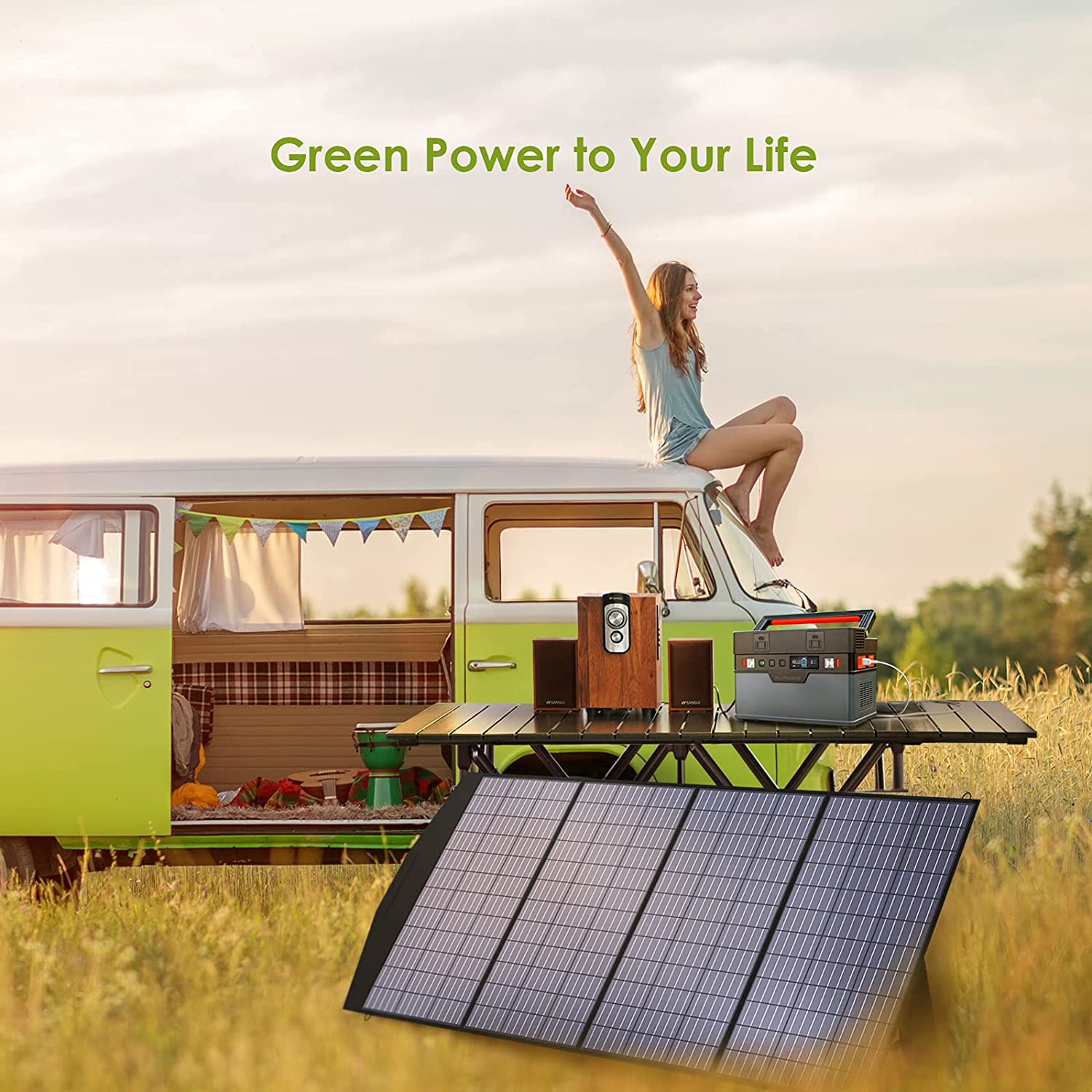
The Allpowers 200W Solar Panel is a great option for those looking to power their camping or RV setup. It's lightweight and portable, making it perfect for traveling the great outdoors without access to electricity.
The panel itself is waterproof and constructed from durable nylon with adjustable brackets that can be adjusted to suit most solar generators on the market. It features an MC4 output connector so you can charge your most common solar powered devices, including laptops and phones.
The price may seem high at first glance but considering what you're getting - 200 watts of charging power - it's actually quite reasonable. The only downside is that it doesn't come with its own battery pack, but if you already have one then this won't be an issue.
DOKIO 160W 18V Portable Solar Panel Kit
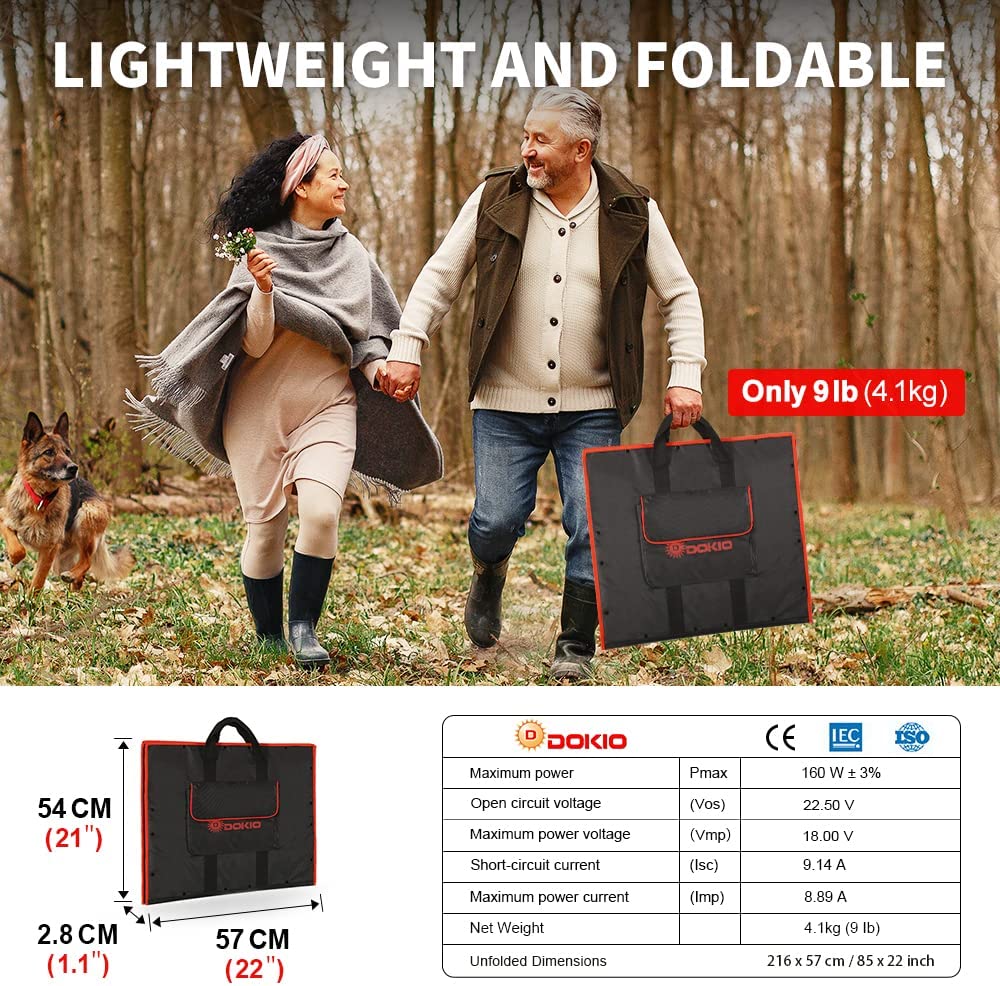
The DOKIO FFSP-160M is a great choice for anyone looking to power their RV, car, boat and more with solar power. This panel packs 160 watts of power into a slim frame that can be mounted on the roof or hung from a stand. The monocrystalline cell inside converts light into electricity with high efficiency, making this one of the most powerful panels on our list.
It also comes with an 18-volt optimum voltage which works well with most 12-volt batteries including deep cycle batteries. The included battery pack charges quickly using USB output so you can start charging your battery right away without having to wait for it to charge first.
The included cord is 9.8 feet long which makes it easy to connect to most power stations and batteries whether you're using it in an RV or other vehicle or powering something else off grid like a farm stand or hunting camp. It folds up small enough to carry around too so you can take it anywhere and use it whenever there's sunlight available.
Foldable Solar Panels FAQs
You're likely overwhelmed with all of the different options for solar panels.
We've answered some of the most Frequently Asked Questions about solar panels so you can make an informed choice. With this information, you'll be able to confidently choose the best solar panel for your needs and budget.
How Long Do Foldable Solar Panels Last?
While there is no definitive answer, since each panel has different features and build quality, we can give you a general idea. According to the experts at Portable Solar Panels, you should be able to get up to 10 years of service from a high-quality folding solar panel (assuming it's used properly). We've seen reports of panels lasting 20+ years in some situations, but that depends on the type of solar cell panel you buy as well as how often and how severely it's folded/unfolded.
A good example would be portable solar panels like those made by Voltaic Systems or Solio which have sturdy hinges and frames. These panels are also backed with a lifetime warranty so long as you follow their care guidelines. If your folding solar panel isn't built well then expect closer to three years of life before significant wear and tear makes it less effective (if not unusable).
Is It Worth Getting A Portable Solar Panel?
Portable solar panels are a great option for off-grid living, but they're also an excellent choice if you want to extend the battery life of your devices while backpacking or camping. The main reason portable solar panels aren't as popular as regular solar panels is because they don't produce as much energy. However, their portability makes them more flexible in terms of locations and situations where you can use them. Portable solar panels are usually smaller than traditional models, so it's easier to manage them and place them in optimal positions.
Portable solar panels have several distinct advantages over regular models: They're portable – this is the primary advantage compared to regular solar panel systems that require permanent installation. Many portable solar panels fold up into a very small size so you can easily transport them to events or vacations where electricity may be an issue;
– this is the primary advantage compared to regular solar panel systems that require permanent installation. Many portable solar panels fold up into a very small size so you can easily transport them to events or vacations where electricity may be an issue; They're cost-effective – though portable models cost more upfront than portable chargers or batteries, they save money in the long run because you don't need to buy batteries;
– though portable models cost more upfront than portable chargers or batteries, they save money in the long run because you don't need to buy batteries; You can position them for optimal sun exposure – unlike standard setups with multiple panel units, most smaller portables only have one panel unit which means positioning becomes crucial since it will directly affect your charging speed and overall production capacity;
Can You Power A House With Portable Solar Panels?
Portable solar panels have a very low power output compared to standard solar panels, so you really need to think about the kind of electronics and appliances you're going to connect up. If you're connecting up the basics like lighting and phone charging, then portable solar panels are fine. But if you want to run your refrigerator or a central air conditioning system then portable solar panels probably aren't powerful enough unless you add extra batteries into the system.
It's also worth thinking about where your portable solar panel is positioned in relation to where it needs to charge. For example, if it's on top of your van roof, then that might be too far away from an outlet for charging purposes unless you've bought various extension cables or adapters that allow for movable positioning of the panel.
Can A Portable Solar Panel Power A Fridge?
Generally speaking, a portable solar panel is not powerful enough to power a refrigerator. If you have no other option and need to keep your fridge running in the aftermath of a natural disaster, you could purchase an inverter (which converts DC power into AC power) and connect the solar panel directly to your refrigerator – but only if you make sure there is absolutely no damage to the refrigeration unit. The NFPA recommends against this practice, however, as it can cause serious damage or injury if moisture or improper wiring comes into contact with live parts inside the appliance.
If you're looking for a more permanent solution that's still portable and affordable enough that you can take with you when evacuating due to extreme weather conditions, then consider purchasing an all-in-one alternative like the SunJack Portable Solar Charger Kit. This product includes panels that are large enough to charge small electronic devices like smartphones or tablets; it also comes with an external battery pack for storing any energy you collect so that you can access it later as needed.
Do Portable Solar Panels Work In Winter?
While it can be tempting to consider a solar panel for your holiday getaway, it's important to note that you'll only see the benefits of the portable unit if there is sunlight. If you live in a country where winter typically means cloudy skies, this might not be the best option for you unless you have access to supplemental lighting inside your home.
That said, we've tested some of the best portable solar panels and found them to work well even when conditions were cloudy. In fact, as long as there was direct light on the panels themselves we saw power being drawn from our batteries consistently. We also liked that many portable solar panels are sealed and waterproof so they could continue to provide energy even during rainstorms.
As always with any type of solar panel it's important to keep in mind how much sun exposure you're likely to receive at your location before shelling out money on one of these devices. If a portable solar panel will only be providing supplemental power in your location then it's worth considering; however, if based on past experience or local weather reports you think the wintertime sun is going to be scarce then this may not be an ideal purchase for you.
Can Foldable Solar Panels Get Wet?
While it's true that solar panels are designed to be exposed to the elements, rain is something that you want to avoid. Exposure to water for even a short period of time can lead to power loss, damage, and an increase in maintenance costs.
Most foldable solar panels feature waterproofing; either watertight seams or sealed ports. In addition, some manufacturers include a protective case or bag with their panel so you can store it during inclement weather. Be sure you have access to these items before you plan on storing your panel outdoors for any length of time.
What Are 3 Cons Of Using Solar Panels?
There are a few disadvantages to investing in solar panels. While they're an incredibly cost-effective way of generating your own electricity, they're not going to power your home entirely and you'll still need another energy source for when the sun isn't shining (or if you want to run appliances that require more wattage than your panels produce).
You also need somewhere sunny for them – unless you invest in panel systems that can be mounted on a rooftop or wall, you'll likely have to get creative with where you place your solar panels, which may mean some landscaping needs to be done first. And finally, while solar generation is extremely safe compared with other forms of energy production, there have been cases of fires starting on panels and these can be costly disasters.
Do You Need A Battery For Portable Solar Panels?
Portable solar panels don't come with batteries, so you'll need to buy them separately. Choosing the right battery can be confusing, we're here to help!
The first question to ask is how much power do you need? That will help determine whether a deep cycle or AGM battery is best for your needs. Deep cycle batteries are designed for high-drain applications like boats and RVs, but they can also work well in solar panel systems. They're usually less expensive than AGM batteries, but they have a lower amp hour rating compared to AGM batteries. Think of it this way: deep cycle batteries are great at powering loads over an extended period of time (hours), while AGM batteries excel at immediate bursts of power (seconds).
AGM stands for absorbed glass mat battery. This type of sealed battery has a higher amp hour rating compared to deep cycle batteries, which makes them better suited as backup power sources in case your solar panels aren't producing enough energy during peak hours. They're also more cost effective compared to deep cycles on a cost per amp hour basis; however they require more care when it comes to charging and cycling compared to deep cycles.
Do You Need An Inverter With Portable Solar Panels?
Portable solar panels are designed to be portable, so you can move them around as needed.
If you're going to be somewhere for a while, it's worth getting an inverter rated for the power of your portable panel system.
For example, if you have a 5W panel and a 300W inverter, then you'll only be able to run low-power devices like lights or cell phone chargers at once. You won't be able to run a fridge unless you connect two panels together in series (which isn't easy for most people). It's better to get an inverter rated for the capacity of your portable solar panels so that you can power more devices at once without having to buy another system.
Is It Better To Have A Generator Or Solar?
Honestly, it depends on where you live. If you're in a place that gets consistent sunlight and moderate wind (think: California or Hawaii), then solar panels are your best bet. However, if you live somewhere that's more consistently overcast (like the Pacific Northwest or New England), then a generator is probably your only option unless you can afford to install solar panels.
The other thing to think about when deciding between solar panels and generators is how much power you need versus how much energy each system can provide. For example, we have a 3 kW generator and it works well for powering our refrigerator while we're camping off-grid at base camp during Burning Man. But it would never be enough to run our whole home (or even one room) for an extended period of time because our home requires 23 kW of power — which no single panel can provide.
So, at the end of the day, having either a generator or solar array to back up your battery bank is ideal; however, we recommend doing further research based on where you live specifically before purchasing either product.
Conclusion
We hope this article has been helpful in guiding you towards finding the perfect Foldable solar panel for your needs. Solar should be an important part of any sustainable living strategy, and having a Foldable solar panel can help you harness that power in an efficient way. With so many options on the market, it can be difficult to know which one will work best for you. We hope this guide helps point you in the right direction! Thanks again for reading!









